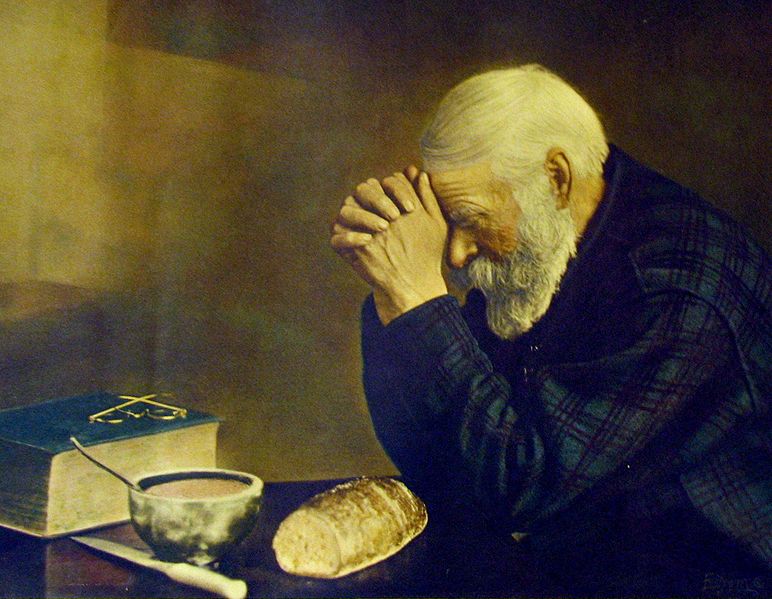Sermon for the Third Vespers of Lent
‘And the people grumbled against Moses, saying, “What shall we drink?”’
+INJ+
‘If you then, who are evil.’ We are indeed evil, for we appreciate nothing which the Divine Majesty has given to us. Even as Adam and Eve did not find Paradise itself, heaven on earth, sufficient, but lusted after the one thing hidden from then, the tree of knowledge, so we, who have unending and innumerable gifts from the Lord, demand more.
This evening, we ponder the petition of our Lord’s Prayer, ‘Give us this day our daily bread.’
This is the prayer of our Lord, to be given bread. This alone did He pray for, for bare sustenance, that He might complete His Father’s will.
Behold how He prays for this of His Father, even as the devil offers him bread from the rocks and stones of the desert. Yet Christ will take nothing from His own power, nor from the power of the devil, nor from the power of the created world. He prays that He might live only from the power of the Father.
Jesus prays, and Jesus trusts, that God will give to Him what is needed, and Jesus demands nothing more. Bread, bread for a day. In Greek, the word reads ‘what is needed to exist.’ Jesus asks only for what is needed to exist yet another day.
He asks only what is needed to live a little longer, for like the ‘birds of the air and the lilies of the field’ He worries not of the future, for the Father will provide for Him a future, even as in the days of old, Abraham promised to Isaac that ‘God would provide a sacrifice.’
‘God will provide the sacrifice’ indeed. And Jesus shall be this sacrifice. He shall complete the work of Isaac. He shall finish the vow of Abraham. He shall fulfill the obedience of humanity required first of Adam, accomplished only in Himself: ‘obedience’ ‘even to death upon a cross.’
Christ only asks for sustenance enough to complete the Father’s will. To be given the bread to bear Him until He finishes His mission, His mission to die, even die for us, ‘who are evil.’
Now this man, the Son of Man, your Lord and Redeemer asks you to pray with Him, ‘Give us this day our daily bread.’ ‘Give me, O God, what is sufficient, that I may live one more day, to do your will.’
The Lord will determine what is sufficient. ‘Clothing and shoes, house and home.’ But if not clothing, nakedness; if not shoes, barefootedness; if not home; homelessness. The Lord will determine. And the Lord will provide what you need to accomplish His will.
We may want more, even demand it. We demand comfort. The Lord affords simplicity. We may demand affluence. The Lord affords poverty. We may demand victory. The Lord affords survival. ‘Blessed be the name of the Lord.’
The Israelites, being delivered from bondage in the land of Egypt, demanded meat and spice, garlic and salt. Yet the Almighty would give to them nothing but what was needed for their journey. He would give them water, for ‘the Lord showed Moses a log of wood, and he threw it in the water, and the water became sweet.’
Why water only, and then the flour of manna, and not feast and festival? Why desert and neediness only, and not green valley and needlessness? Why would the Lord give so little, merely ‘daily bread’ when it is in His power to give so much?
The Israelites deemed themselves accursed, though they were delivered; even as Job deemed himself accursed, though he was chosen; even as our Lord was deemed accursed, even as He was glorified.
He gives to the Hebrews so little, only what is needed, that the Israelites might not think too much of Sinai, but rather think of that ‘land flowing with milk and honey.’
He gives to the Christ so little, only what is needed, that He might now not take for Himself all the kingdoms of the earth, but rather make ‘a kingdom not of this world.’
He gives to us, His children, nothing but a fish and an egg, so little, that we might not be seduced by the decadence of fleshly pleasures, but rather look to the ‘gold and sapphire’, ‘the boundless walls and twelve gates.’ To the ‘heavenly Jersualem.’ Our Home, our true home, our only home.
I tell you again, my brethren, that ‘our citizenship is in heaven.’ Love nothing that is created,
save the image of God in family and in neighbor, for that image is uncreated.
Cling to nothing that is made, save to parent and child and spouse and friend, that are not made, but begotten. And ask nothing of God but ‘an egg’, what is needed to fulfill your vocation for a day, for I tell you, from an egg shall spring all life. From an egg shall spring eternal life. From the little that the Lord affords you for now will arise a now that shall never end.
‘Behold how much more will the heavenly Father give.’
‘For the angel showed me the river of the water of life, bright as crystal, flowing from the throne of God through the middle of the city.’
For the wood of Christ’s cross is thrown into the water of baptism, ‘and it has become sweet.’
‘And no longer will anything be accursed.’
+INJ+



